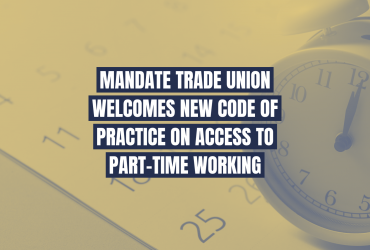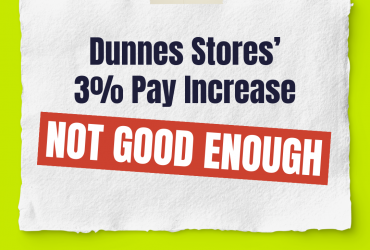Building a recovery on the backs of workers
Thursday 8 October 2015SINCE the financial crisis began in 2008, Mandate members have had to put up with attacks on their living standards from all fronts; from their employers – through pay cuts, cuts in hours, reduced conditions of employment; from the free market where rents and property prices have all but emptied their pockets; and from government policies with cuts to lone-parent’s allowance, child benefit, and the introduction of the USC, the property tax and now water charges.
In 2012, Mandate published Decent Work: The Impact of the Recession on Low Paid Workers which showed that Mandate members in the retail sector had lost €109 per week due to all of the cuts up to that point – shockingly that equates to one-third of their incomes. If it weren’t for our members and other trade union members fighting back, things would be so much worse, not only for them, but for society in general.
Mandate members have now won more than €30 million in pay increases since this current government took power in 2011. This excludes the number of workers who have won other entitlements like guaranteed earnings through banded hour contracts, enhanced redundancy packages, pension contributions, and much, much more. It also fails to capture the number of workers who were on frozen increments, which have now been “unfrozen”.
Mandate’s 40,000 members now have a combined spending power of over half a billion euro – a number that would be so much lower if the bosses had been successful in their attacks on incomes. As workers in the retails sector, approximately 90% of this money is recirculated back into the local economy. It’s spent in local shops, bars, restaurants and other businesses, helping to generate employment and remove people from social welfare. It’s also boosting the Government’s coffers through increased PRSI contributions – both employer and employees, increased income tax rates, increased VAT, etc, etc. The increases have also helped to reduce the Government’s spending on social insurance contributions including the part-time dole and Family Income Supplement making the Government’s balance sheet look even healthier.
All of these benefits were fought for by trade union members. They weren’t handed down from a benevolent employer or politician. Some of our members had to go on strike, walking the streets in the cold and the rain, over the past four years in order to either protect their existing terms and conditions of employment, or to fight for better ones.
Yet now we hear from the commentariat and politicians about a recovery. A recovery for whom? It’s not a recovery for the 40 people losing their homes every month. It’s not a recovery for the 400 to 600 people waiting on hospital trolleys around the country right now. It’s not a recovery for the 250,000 people still languishing on the dole because for every job vacancy, there’s 23 applicants.
And it certainly isn’t a recovery for the 300,000 of our brothers, sisters, sons and daughters who were forced to emigrate due to the policy of “protect the banks (and bankers) at all costs”.
In the last Budget, the Government gave tax breaks to some of the top earners in the country. They gave tax breaks to corporations too. Those tax breaks were only possible because of all the hard work and sacrifices Mandate members – and other trade union members – have experienced in order to boost and protect their incomes.
And now more tax cuts are planned for this Budget. Bear in mind that every time there’s a tax cut, there’s a corresponding reduction in public services, such as subsidies to public transport, meaning the costs for buses and trains go up.
Tax cuts mean our public healthcare system remains in dilapidation with 90 year old women waiting 48 hours to be seen by a doctor in A&E. And tax cuts for high earners mean cuts to social welfare for vulnerable people like lone parents.
So when this Budget comes around in a few days, take note of all of the economic policies being implemented. Remember we are less than six months out from an election and some of the key decisions made by government Ministers will reflect this reality.
If we are building a recovery in Ireland, but it’s built on the sacrifices of us, the workers who have fought for improved terms and conditions of employment over the past four years. We are the wealth generators of this country, not the politicians or the employers.
As we continue to win pay increases and increase domestic spending, we give this Government scope to loosen the purse strings. The question is, will they spend it on you and your family through increasing public spending, or will they give it in tax cuts while reducing public services. Either way, they should be held accountable at the next general election, not only for their decisions in this Budget, but for the decisions made in the previous four too.
Read more articles from Mandate’s Shopfloor here (online version). You can download the pdf here.
By David Gibney
Mandate communications officer






